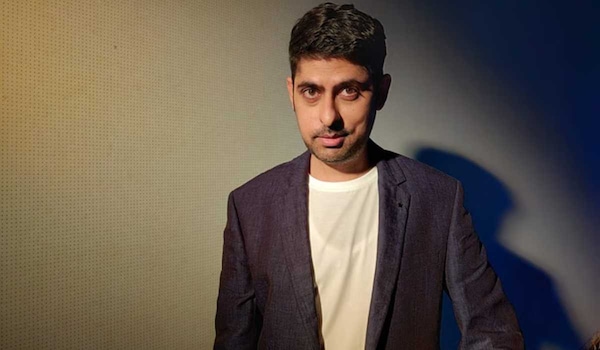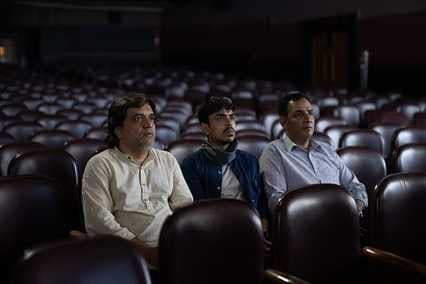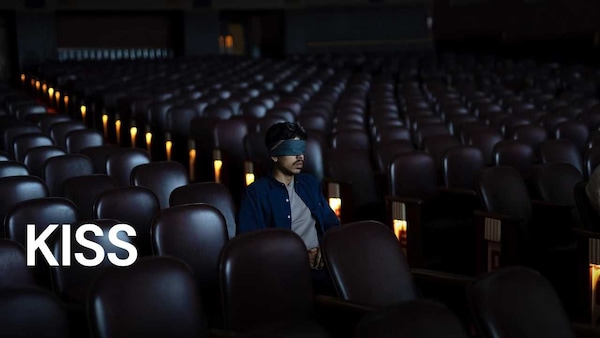Varun Grover on KISS: 'Idea of censorship comes from the society we've lived in' | Exclusive
Varun Grover shares his journey directing KISS, inspired by censorship debates, blending empathy and politics, reflecting on cinema’s impact, freedom’s flux, and humor as personal therapy.

Last Updated: 05.14 PM, Jun 07, 2025
Ahead of the release of his directorial debut short film KISS on the prestigious global platform MUBI, Varun Grover spoke exclusively to OTTplay about the journey of bringing this intimate and thought-provoking story to life. Known widely for his sharp wit and insightful storytelling, Grover shared his excitement about finally presenting KISS to a wider audience after its festival run, the inspiration behind its nuanced take on censorship and compassion, and how his personal experiences with cinema shaped his creative vision. In this candid conversation, he also reflected on the evolving landscape of freedom in India, the power of humour, and the shifting tides of pop culture narratives.
How are you feeling that your directorial debut KISS has finally released on OTT?
This is my first film as a director, and I'm very, very attached to it. I'm very thrilled about it, especially thrilled that it is coming on MUBI, which has been one of the most prestigious film platforms, and also, apart from that, a constant library for me where I can go and watch world cinema and the best of world cinema. So for me, it is a real pleasure that my first film is coming on MUBI, and I can't wait to see how people react. It has done the film festivals and all, but now it is like the first ever release, a proper release for the film. So, I'm thrilled.
So how have you been so patient?
I think, for a short film, I mean, it is a rite of passage that you have to wait for your first short film to get out because short films don't have a very good market. There's no one who really wants to — the big OTTs, even if they get a short film, kind of hide it somewhere in the back. No one can discover the film unless they personally know that this film is on the platform, so it gets lost. So we were waiting for a good opportunity; the producer, Newton Cinema, was also waiting for a good platform. Then it just so happened that the movie deal finally happened. Also, this was the final year, so in 2022 the film was supposed to world premiere at the Rotterdam Film Festival, which is one of the most prestigious film festivals. Then because of COVID, they curtailed the section where it was supposed to play the film. Then they promised that they would still play the film later. So it played this year in 2025 and Rotterdam screened it in a section which was just created especially for films they could not take earlier. So for me, it is almost like, okay, the film was supposed to play at Rotterdam as the first festival, and it played at Rotterdam as the last festival it went to. And now it comes right after that. So it kind of feels like not too long a wait. It is a long wait, but also, we were travelling with the film, so I never felt like the film was done. So that was helpful.
What was the initial spark behind KISS? Was there a personal experience, news headline, or cultural observation that inspired you to write and direct this story?
Yeah, no, there was an actual news item which keeps happening every two years. You'll see one news item about the censor board saying they have asked the film to cut down the kissing scene from this number of seconds to that number of seconds. And it happened in 2018 or 2019. I remember there was one big news story about the Censor Board asking the film team to reduce the kissing scene duration from 22 seconds to 11 seconds. And it was funny news. I was like, what? How did they come up with that number? Like, okay, either they are not okay with the kissing scene, and they can say, remove all of it, but to reduce the duration of it felt bizarre. So that got me thinking, and I thought, okay, I should write something about it, but not in a funny way where I just make fun of this thing. In fact, I wanted to understand where this kind of thinking comes from, and I wanted to have a slightly empathetic look at this and at the people who make sense of good and... I don't know, an empathetic or analytical kind of psychoanalytical view. I thought, okay, let's try this, and so I wrote this basically.
The film beautifully captures the experience of suspending disbelief in a dark cinema hall and allowing the magic to take over. What’s your earliest memory of that happening to you as a viewer—and is there a particularly powerful or even unsettling instance that shifted something within you or changed the way you saw the world?
So, the thing is, my father is a big film buff, and he used to take us along on lots of these single-screen viewings in the 80s and 90s and even till the age of 14, which was quite a grown-up age. In 1994, when Hum Aapke Hain Koun..! came out, I was 14 years old, and I was so distressed by Renuka Shahane's death in that film, when she slipped. I was crying all the way home, and then I was depressed for two days till I saw her on TV, on Surbhi. So Friday we watched the film on the first day of the screening, and then Sunday, at 9:30 pm, she appeared, fully glowing, happy and all. I was like, "Oh, thank God, she's alive." This was just a strange thing. I was not a five-year-old or a six-year-old to believe that, and still, I needed that reassurance to see her on TV, that she's alive and she's not dead. I mean, cinema had that kind of a strange impact on me, that I would believe people who die in cinema are dead or at least feel affected by it, even if I knew, like, intellectually I knew, "Okay, she's not dead," but emotionally, I felt that way. So those kinds of feelings — I've been watching films on the big screen from the age of four. I think the first film I saw on screen was at the age of four; I have very vague memories, but it was a film called Nikaah, which had Raj Babbar and all. That was the film I saw in 1984, and after that, I saw lots of Mard and Sangam and lots of old and new films on the big screen.
Watch the powerful short films Nitishastra, Devi, Chubhan, and Shame now streaming on OTTplay Premium for stories that leave a lasting impact!
KISS is both intimate and political. How did you balance tenderness and commentary while shaping the narrative?
I think that is something which comes with lots of rewrites. I mean, the first draft probably was overcooked, then I tried to kind of bring it to a certain level of balance, where I balance the various elements. And there are two or three themes going on in the film. I think it's a function of the team I got to work with. Like the actors are so brilliant and so nuanced — like Adarsh Gourav, Swanand Kirkire, and Shubhrajyoti Barat, they are. So I think the measure in what they do also helped me a lot to bring those slightly complicated elements to the fore easily. So that was also, I think, one factor; most, if not all, writing is rewriting. So all — I mean, all good writing is many, many rewrites.

You often speak about compassion as politics in your work. How does KISS reflect that ethos?
As I said, because when I read the news or when you talk about censorship, there is generally, I mean, from people who think of themselves as liberals, the idea of censorship is always a ridiculous idea, and we ridicule it. We make fun of it. We talk about it as if they are uneducated folks who don't know anything about how the world works or how art should be completely uncensored. But then, if you meet people from the censor board, they are people like us; they have gone to the same colleges and schools, lived in the same cities, and come from similar families. So how come they have these very different points of view on something which we believe should not be censored, for example, a kissing scene in a film? So then I thought, okay, if I have to make something on this topic, it has to start from compassion. The compassion is in trying to understand where the idea of censorship comes from. It doesn't come from sitting in that room. It comes from their lives and it comes from the kind of society they have lived in. We all have lived in there. We all have been brought up there. So then I thought, we'll — I mean, at least I'll try to not ridicule them. Ridicule them, yes, but also try to understand where they come from. That is the compassion part in the film. I hope that, I mean, it comes through when people watch it, but, yeah, that was the idea.
The definition of freedom in India has evolved significantly in recent years. Has your personal understanding of freedom changed as well?
I mean, it has changed for all of us. The thing is, we are constantly in any society that is in churn, which we are right now; there are new rules and regulations on a daily basis. Sometimes, you can't say this. Sometimes you can't say that. It depends, almost like it's a weather forecast kind of thing that today you can't; you're not allowed today. You should not step out because it might rain today. You should not step out, because it is a heat wave, so it is that kind of thing. So you are constantly, as an artist, adapting on a daily basis and figuring things out. Say, if I perform stand-up comedy, I don't know, in Mumbai or Bengaluru or Delhi or Indore or Lucknow, there are different things I have to be careful of. There are various things, I don't know, red lines in the air, which I cannot cross. Sometimes I try to adhere to that. Sometimes I'm like, okay, I don't care what happens. So, it is a very floating kind of situation.

Do you think the current wave of hyper-masculine nationalism in pop culture is sustainable—or will we soon see a counterwave?
I think there are always phases, and this is also a phase, and this hyper-masculinity, especially even when it is not connected to nationalism, sometimes it's just angry men in films. That is what I've observed: that almost 80% of film posters in the last six months or one year have one angry man with a weapon on the poster and it can be any time period. It need not be today; it need not be 400 years ago; it's just Angry Men. I think statistically, people are already kind of getting slightly bored of this kind. There are films that are working. And the thing with the Mumbai film industry is that if something works, there are 100 more of the same. But if something doesn't work, they just kind of feel maybe it didn't work because of this factor or that factor. But when it works, they believe it worked because of the specific trope they used, while it may have worked for many other reasons also. Sometimes it's the star, sometimes it's the music, sometimes it's the kind of emotional issue it talks about and so on, but I think it is a phase. I mean, just going by historical proof, there is nothing. I'm not a fortune teller, but just going by statistics, the data from the past, where every five years, there was a wave of love stories. There was a wave at one point about comedies. So there are these things which keep happening, and I'm hopeful, because it is a creative industry; ultimately, the market-linked creative industry will self-correct in whatever way it is required to.
Do you see humour today as a shield, a weapon, or both?
First of all, I think it is, for me, just an expression. It is not a shield, not a weapon. It is therapy. In a way, it is something which I have to express to feel alive, to feel balanced, and to feel that I belong. And then after that, sometimes it is a shield; sometimes it is not a weapon but still a kind of a poke at someone who is too powerful or too full of themselves. So sometimes it is a poke, but above all, I think it is a form of collective expression of how we live, and if I say something which is funny to me and one million people on YouTube find it funny, then that means we all agree we are living in a system which is broken, and at least that agreement is bringing the relief to us that we are not changing the system. If I talk about a bridge not being made for five years in Andheri and I make a joke about that, and then one million people laugh at that, we are not getting the bridge made but we are releasing the tension and stress in our minds or the anger in our minds by laughing at that joke, and that is therapy. So that is, I think, first, whatever reason I do comedy, just for therapy, my own, and probably others.
Subscribe to our newsletter for top content, delivered fast.





